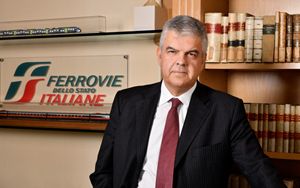(Finance) – “We are in line with the progress of the National Recovery and Resilience Plan which allocates 25 billion euros to the railway network. Of these we have spent 7.5 on works already completed. By June 2026 we will invest the further 18 “. The CEO of the FS Group Luigi Ferraris he told Sky TG24 Economia the commitment of Ferrovie dello Stato to the modernization of the transport system in Italy, in a sustainable and intermodal way. “To improve the country’s railway infrastructure – he explained Ferraris – we have an investment plan of 200 billion euros over ten years and 40% of these resources. 80 billion euros are dedicated to the South to reduce the gap between the North and South of Italy and better connect the latter to the rest of Europe”.
To continue to invest in the best possible way modernization of infrastructure, according to Ferraris, “it is important to find formulas to support the profile of ongoing investments, perhaps involving private savings, through bond issues in a revised regulatory framework”. The following are fully included in this context construction works of the high-speed line between Naples and Bari. “An important connection which is progressing quickly and which will see an increase in transport capacity and speed. We will travel from Bari to Naples in two hours. While today – he explains Ferraris – it takes a little less than double. Bari-Rome will therefore be done in three hours”. Another example of a strategic work in progress is that of third crossing point of Genoa and the doubling of Tortona Voghera, which is not in the PNRR and will allow for a Genoa-Milan connection in less than an hour. “Which means – underlined Ferraris – that we will have the cities of the industrial triangle Genoa, Milan and Turin connected to each other within an hour”.
At the top of the agenda of Ferrovie dello Stato, there is also the transport of goods, an area in which the FS Group aims to double the share of train transport which currently stands at 11%. All in a complex economic and geopolitical context, as demonstrated by the tensions involving Western merchant ships in the Middle East. “In the last week, the narrow Suez Canal which connects the Red Sea to the Mediterranean has experienced a 35-40% drop in ship passages and their containers – argued the CEO of FS –. It is clear that this geopolitical context is penalizing the entire Mediterranean basin and is having repercussions on our ports. The current situation, however, must not stop our plans. Italy needs 300-400 billion euros over the next 20 years to be used also and above all in the development of ports and multimodal terminals to continue to make Italy a logistics hub in the Mediterranean”.
Finally, from Ferraris also a note on the recent appointment of president of the European Region of the UIC (Union internationale des chemins de fer), international institution that brings together the main actors and stakeholders of the railway sector. “A position that I am honored to hold – he admitted Ferraris – because we will have the opportunity, between now and the next two years, to work on a competitive, sustainable and attractive rail transport system, in a perspective of growing decarbonisation which will be our main objective, while digitalisation and innovation will be the our enabling factors”. The first meeting of the European Management Committee under the new presidency will be held on 19 February 2024 in Rome. “One of the points we will work on will be the digitalisation of railway infrastructure networks. Being able to have all the information – added the CEO – will allow us to optimize predictive maintenance. We will form integrated working groups with other countries to develop innovative technological solutions, based on this data, also because the railway market on both the passenger and freight side is now European”.
In closing, Luigi Ferraris is back on centrality of intermodality for goods and passengers. Intermodality is central to the FS Group’s projects to “facilitate the movement of people with multiple means of transport and possibly with a single sales solution. We are working on a platform to share information with all mobility players without neglecting parking, which is fundamental for the development of intermodality, also for freight trains – he concluded Ferraris – it is essential to have an interchange with the various means of transport and combine the train with trucks and ships. We, as Railways, are investing in the logistics hub in this sense.”
